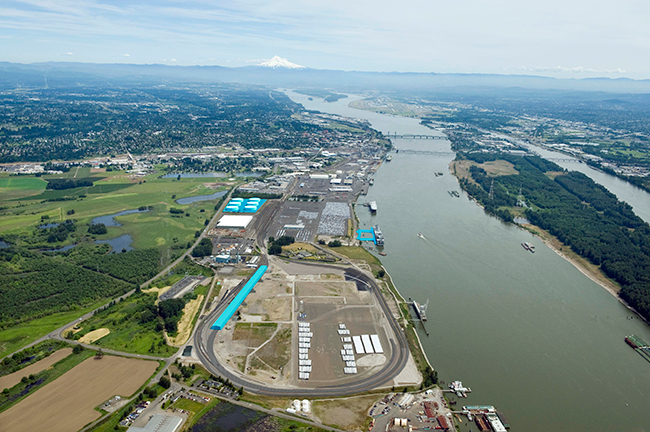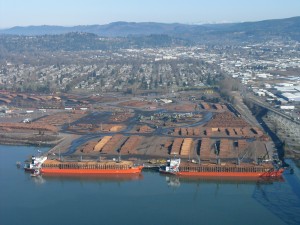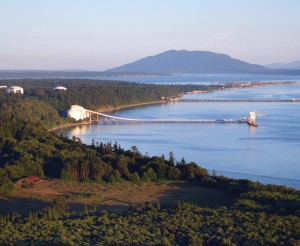Big Energy’s rush to the Pacific will hit some serious roadblocks next month, kicking off a year that will be full of big-time politics over coal and oil exports. The decisions about energy and politics in 2016 could begin to decide the face of the Pacific Northwest for generations to come.
Next year, three huge export terminals — including the largest coal and oil export terminals in the nation if they are built — go into the next chapter of their long process, and elections at the national and state level will coincide with emotional debate at the local level.
The future of only one of the proposed Washington-state terminals — the Tesoro Savage Vancouver Energy Distribution Terminal — could be decided in 2016. The fate of the proposed Millennium Bulk Terminal in Longview looks like it will be set in 2017 at the earliest, and Gateway Pacific Terminal at Cherry Point north of Bellingham is unlikely to be decided before 2018. The latter two are coal-export facilities; Vancouver is an oil port.
Opponents of the proposals are gearing up for a major effort in January, beginning with the giant Tesoro Savage terminal at the Port of Vancouver on the Columbia River. In expectation of that push, the state agency considering Vancouver’s Tesoro Savage oil terminal on Wednesday added a second January hearing in Clark County; another will be held in Spokane Valley, where rail traffic is heavy. (Hearing and terminal details here.)
Tesoro-Savage could be decided earliest because the process is controlled by a single state agency, the Energy Facility Site Evaluation Council (EFSEC). The council is comprised of about a dozen state and local agency representatives (the number varies according to project), and a fulltime chair, veteran state adjudicator Bill Lynch. Sitting in the background, however, as the Big Kahuna, is Gov. Jay Inslee, who must take the Council’s recommendation and make the final call for or against the terminal.
All of the terminals would depend on shipments delivered by BNSF Railway, and much of the persistent opposition to the terminals centers on concerns about rail safety and impacts on human and environmental health. Eight Pacific Northwest oil refineries are already taking some shipments of Bakken crude oil by rail.
At both the national and state levels, energy policy has become almost totally partisan, particularly if decisions relate to climate change. In a telling October vote, U.S. House Republicans pushed through the a measure to repeal the 1975 ban on exporting American crude oil. The ban was originally passed in reaction to an Arab oil boycott, long before fracking and horizontal drilling released new volumes of oil and natural gas. Senate Republicans are still short of votes for exports but oil lobbyists are trying mightily to forge a compromise to pick up additional votes in the Senate and to convince President Barack Obama to agree to lift the export ban.
If the 2016 elections produce a Republican president to go with a Republican Congress, the floodgates to exporting American crude to Asia will almost certainly be opened. In the current D.C. alignments, Big Energy can be countered by environmental money and influence, but a full Republican sweep in November would rebalance the scale. Indeed, the Tesoro-Savage application would likely be joined by other oil-export schemes if the export ban is lifted.
Tesoro-Savage’s application is for a Vancouver operation that can work without a lift of the export ban. The company’s plan is for a site that lies on the Columbia River, essentially just across the water from Portland and only two miles west of a green-oriented waterfront development planned by the City of Vancouver. The facility would receive four 120-car unit trains a day and transfer the Bakken crude oil to ships or barges. The oil would go to the 24 refineries on the Pacific Coast, six of which are Tesoro plants.

The ships would be mid-size tankers, with a loaded draft of 41 feet; the Columbia is dredged to 43 feet. An estimated ship per day equates to 365 round trips a year, or 730 passages on the Columbia River with what is generally considered a treacherous bar and shallow channel.
EFSEC commissioned a draft environmental impact statement (DEIS) to review the materials submitted by Tesoro-Savage, and its release on Nov. 24 triggered public response. Opponents have geared up to challenge the oil port, and it is apparent their major focus will be on questions about transportation safety and the environment along both the river and rail lines. Environmentalists are waging their opposition campaign through Stand up to Oil, a new organization but with familiar faces from the battles against coal exports. Opposition also comes from city councils on both sides of the Columbia, in Portland and Vancouver and the Columbia River Gorge Commission, an official body to govern the Gorge National Scenic Area.
Gorge commissioners, appointed by the governors of Oregon and Washington and six counties with Gorge jurisdiction, asked more than a year ago for a moratorium on new fossil fuel transport through the Gorge. Friends of the Columbia Gorge, a private organization formed in the 1980s to promote Gorge protection, has also weighed in, particularly regarding the safety of oil trains. Friends conservation director Michael Lang also points to threats to wetlands from vessels, and to scenic values. “We can’t stand by and watch this new and increased use threaten everything we’ve been working for,” he told Crosscut.
The Port of Vancouver has been a strong supporter of the project. Indeed, Tesoro-Savage was initially approved by the Port of Vancouver only days after a disastrous oil-train explosion in Quebec killed 47 people in August 2013.
Other spills, although of less significance, have served to increase opposition to shipment of crude oil by train. The DEIS released by EFSEC, using rail data largely collected before the recent surge of oil by rail, estimated a derailment as often as every two years, but an oil spill from derailment only every 12 years.
The obvious unreliability of estimates of this sort—in either direction—encourages both industry sanguinity and public fears. What is clearer, however, is that first responders, particularly those in small towns or rural areas, do not feel they are prepared for spill emergencies, despite BNSF efforts to train both rail workers and first responders. The volatility of Bakken crude—it is more flammable than other crude oil—only adds to concerns of first responders and the general public.
Tesoro-Savage would add 36 trains of oil per week to a rail system already carrying roughly the same amount, according to a detailed report in July by Sightline, an environmental group fiercely opposed to the project. Another 30 oil trains per week would be added if all of the several other proposed oil terminals are built, an unlikely prospect. However, despite BNSF’s aggressive upgrading efforts on its tracks, adding oil trains to the coal trains already serving Canadian ports and the ones proposed for the Millennium and Gateway Pacific projects threatens to overwhelm its rail capacity. The Columbia Gorge is one of several pinch points where the rail system is already at or nearing capacity.
EFSEC contracted its DEIS with Cardno Inc., an international consulting firm with offices in Seattle and Portland. Stephen Posner, EFSEC executive director, told Crosscut that Cardno made its own independent analysis of the applicant’s work in seismic, transportation and emergency preparedness and that analysis is included in the document released on Nov. 24. Chapter Four of the DEIS, covering crude oil safety and potential releases, is clearly the most detailed and independent segment of the document.
After public comments close Jan. 8, EFSEC then conducts an adjudicated decision process before sending its recommendation to Inslee. Once the recommendation is received, Inslee has 60 days to make a decision.
The issue will draw enormous controversy, particularly along the Columbia, making it difficult to predict an EFSEC decision date. But it is likely a final decision will fall during Inslee’s current term, which continues through this year, if not before his November re-election bid.
Although Inslee’s only major Republican opposition so far is coming from Bill Bryant, a Port of Seattle commissioner making his first try for higher office, control of the Washington Legislature is very much up for grabs in 2016. In the Washington Senate, a few additional Democratic victories next November could switch control of the important Energy Committee away from Republican Doug Ericksen of Ferndale, a favorite of the energy industry. His most prominent critic on the committee has been Democrat Kevin Ranker of Orcas Island, whose district abuts Ericksen’s in Whatcom County, site of the proposed Gateway Pacific coal terminal. Ranker is Ericksen’s total opposite on energy. But the state House is a different story entirely. There, the long domination by Democrats is at risk, with the party’s margin of control down to just two votes after several years of persistent gains by Republicans. Indeed, a House switch may be considerably more likely than a change in the Senate.

The two coal port proposals bear both similarities and differences with the Tesoro-Savage plan. Like the Vancouver site, Millennium sits on an abandoned industry site used for many years; pristine it is not. Essentially, the industry’s position is that history is determinative: Neighbors have learned to accept, if not to love, the noise, congestion, air pollution ... and, most importantly, the jobs.
Politically, Vancouver has a sharp divide and is a vital, growing urban area. Longview, in contrast, seems united for the Millennium coal terminal (opposition is largely from outside defenders of the Columbia River), and it is a depressed mill town with not much else going for it.
The Millennium draft EIS is due April 30, and hearings and revisions will push the review into 2017. Cowlitz County commissioners are strong for the terminal, however, and not likely to reject it, regardless of testimony. Several state agencies have considerable power, however.

Gateway Pacific in Whatcom County is quite different in two big regards: The Lummi Nation considers it as part of their treaty-guaranteed fishing grounds, and the site has never been an industrial operation, although it is zoned for industry. It is actually in a state aquatic reserve with rules and regulations that appear to make a coal terminal out of synch. Commissioner of Public Lands Peter Goldmark, who has the final vote in granting a permit for the terminal, stands for election in 2016, if he seeks a third term. If he declines, look for money to pour into this otherwise-obscure state race. Terminal backers failed in 2013 and 2015 to gain seats on the Whatcom County Council, which has one of the most important votes on the terminal. Six of the seven 2016 council members were backed by anti-terminal forces while their opponents had backing from key terminal players. The Council could be labeled skeptical at best, perhaps hostile to the coal port.
With all three export terminals, the U.S. Army Corps of Engineers has power to reject the terminal, but its range for decision making is not as broad as state and local powers. The Corps has been pressured to kill Gateway Pacific based on Lummi claims of treaty rights, but has been reluctant to respond. Now, Republicans in Congress are mounting an effort to further delay the Corps’ ruling, perhaps in hopes of a good result in 2016 elections.
The coal ports entered Washington’s political and environmental space in late 2010 with Millennium’s quick approval by Cowlitz commissioners. An equally quick lawsuit from opponents, spearheaded by Columbia Riverkeeper, halted the project for nearly two years. Gateway Pacific emerged in early 2011, quickly drawing Bellingham environmentalists’ opposition, joined by residents near the BNSF tracks along Bellingham Bay. Since 2012, the coal market has tanked, and Millennium and Gateway have had a shifting tableau of financial backers.
In six years, terminal supporters and opponents have dug in with determination, although faces have changed on both sides. The economics of coal, the abundance of crude oil and, above all, the heated debate over climate change have brought new fervor into the discussions. The hardline partisan divide in American politics simply adds to the intensity on both sides.
We will get some answers on the partisan frontier in 2016 but at best only one of the three terminals—ironically, the last to apply—has a chance of a final resolution before this time next year.


